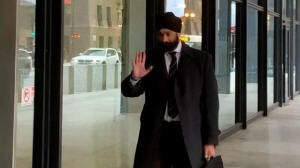Ex-speaker faces prosecutor Bhachu at corruption trial
 Send a link to a friend
Send a link to a friend
 [January 14, 2025]
By Jim Talamonti | The Center Square [January 14, 2025]
By Jim Talamonti | The Center Square
(The Center Square) – Prosecutors are taking aim at Michael Madigan’s
previous statements at the former Illinois House speaker’s bribery and
racketeering trial in Chicago.
Assistant U.S. Attorney Amar Bhachu peppered Madigan with questions
Monday afternoon about how the former speaker’s political supporters got
jobs.
Bhachu asked Madigan about his previous testimony that he was angry when
he heard evidence that several of his allies had been getting paid for
do-nothing jobs.
Bhachu then introduced government exhibit 156, a recording of a
telephone conversation between Madigan and codefendant Michael McClain
on August 4, 2018.
During the call, Madigan referred to former union executive Dennis
Gannon.
“Remember, we got him that contract,” McClain told Madigan.
“Some of these guys have made out like bandits, Mike,” Madigan told
McClain.
“For very little work, too,” McClain said.
Madigan and McClain are charged with 23 counts of bribery, racketeering
and official misconduct in connection with a scheme that federal
prosecutors referred to as "Madigan Enterprise."

Prosecutors allege that ComEd and AT&T Illinois gave out no-work or
little-work jobs and contract work to those loyal to Madigan to get
legislation passed that would benefit them in Springfield. Four ComEd
executives and lobbyists were convicted in 2023 in a related trial, and
ComEd itself agreed to pay $200 million in fines as part of a deferred
prosecution agreement with prosecutors.
Madigan said former Chicago alderman and precinct captain Frank Olivo
was his neighbor for “ten years, maybe more” and that he recommended
Olivo’s appointment to the city council by then-Mayor Richard M. Daley.
The former speaker said he watched Olivo’s son, also named Frank, grow
up and attended social gatherings with the Olivo family.
Bhachu displayed an email from April 2018 with names of people to be
invited to Madigan’s birthday celebration that year.
The list included McClain, then-Madigan chief of staff Tim Mapes, 13th
Ward Alderman Marty Quinn, Olivo and their spouses, along with a few
other longtime acquaintances and family members.
Bhachu asked Madigan about his statement last week that he was not aware
of Olivo receiving payments from ComEd for doing little or no work.
“That’s my testimony,” Madigan said.
Madigan said the ward committeeman determined who remained a precinct
captain in the 13th Ward.
“I was the ward committeeman,” Madigan said.
Bhachu asked Madigan if he knew about precinct captain Ray Nice getting
paid by ComEd through lobbyist Jay Doherty.
“I knew he was working with the Doherty company,” Madigan said.
“How did you know?” Bhachu asked.
Madigan said he didn’t have a memory of how he knew.
Madigan answered questions from Bhachu about a recorded call during
which the former speaker and McClain discussed precinct captain Ed
Moody’s deal with ComEd contractor Shaw Decremer.

“He had a full-time job at the same time Mr. McClain and Mr. Doherty
were paying him, isn’t that right?” Bhachu asked.
“That’s my understanding, yes,” Madigan confirmed.
The former speaker said he expected Moody to stop receiving the payments
once he obtained a full-time position in Cook County government.
Bhachu asked if Madigan’s job as a lawmaker was a full-time position.
“I worked as speaker seven days a week,” Madigan said.
“You worked at a law firm at the same time you were speaker of the
House, right?” Bhachu asked.
“That’s correct,” Madigan said.
Bhachu introduced an email from McClain to then-ComEd executive Fidel
Marquez.
“Our friend has talked to Ed Moody. Shaw is OK with his role. Please
initiate all the paperwork,” the email stated, referring to Shaw
Decremer.
When asked about his 2017 conversation with Moody about the work he
would be doing for Shaw Decremer, Madigan hesitated.
“I don’t recall,” Madigan said.
“Not that particular conversation,” Madigan said when asked again.
Bhachu asked Madigan if he checked to see if Ed Moody was working hard
for ComEd when he advised McClain to stop payments to Moody.
“I got a question. I gave advice,” Madigan said.
“It was a narrow question. I gave a narrow answer,” Madigan said when
pressed again.
Bhachu asked the former speaker about his testimony at a civil
deposition on Sept. 13, 2018, when Madigan testified about how he
determined who he would recommend for jobs.
Madigan mentioned candidates who met his test for honesty and integrity
and testified that Ed Moody and his brother Fred would meet this test.

Bhachu asked if Madigan’s ward organization paid the precinct captains.
“Not to my knowledge,” Madigan answered.
The former speaker agreed that many of the precinct captains expected
Madigan to find a job for them in return for the political work they did
for Madigan.
Prosecutors then played a videotaped interview from 2009, when Madigan
discussed political patronage and how he took precinct captains and made
them into salesmen.
“You’re gonna work for the Democratic Party,” Madigan said he would tell
the precinct captains.
Madigan agreed that he was successful in his efforts to obtain work for
Olivo, Nice and Ed Moody.
“In the case of [former state Rep. Eddie] Acevedo, I just gave his name
to McClain,” Madigan said.
[to top of second column]
|

Federal prosecutor Amar Bhachu enters the federal court building in
Chicago on Nov. 27, 2024 - Jim Talamonti | The Center Square

Bhachu asked Madigan about the hiring of Jeffrey Rush, the son of former
U.S. Representative Bobby Rush, D-Chicago. In a recording previously
introduced by the government, Madigan explained to McClain that Jeffrey
Rush needed a job after he was dismissed by the Illinois Department of
Corrections over a sexual relationship with an inmate.
Madigan said it was Congressman Rush who informed him that his son
Jeffrey needed a job. Prosecutors introduced an employment document from
Friends of Michael J. Madigan, which is the former speaker’s campaign
committee, for Jeffrey Rush.
Bhachu asked the former speaker about his friendship with McClain.
“Did you ever tell him you appreciated his friendship?” Bhachu asked.
“Not that I recall,” Madigan responded.
Bhachu asked Madigan about an email in which McClain expressed that he
was “at the bridge with his musket” and ready to defend Madigan and his
family.
“I don’t think I was as loyal to him as he was to me,” Madigan
testified.
“You trusted Mr. McClain with sensitive matters, right?” Bhachu asked.
“Sometimes,” Madigan answered.
In June 2018, around the time when Madigan Chief of Staff Tim Mapes was
dismissed over a sexual-harassment allegation, Madigan said he was not
aware of people clamoring for the speaker’s resignation.
Madigan said he did recall discussing the hiring of a crisis management
firm with lobbyist and former Madigan aide Will Cousineau.
The former speaker admitted that he sometimes asked McClain to direct
the activities of other legislators.
“Were you paying him personally for the work he did for you,” Bhachu
asked.
“No,” Madigan answered.
“So he was doing it for free?” Bhachu asked.
“Yes,” Madigan said.

Bhachu asked about union contributions to the Friends of Michael J.
Madigan, asking if it would not be unusual for labor unions to donate $3
million to $4 million per year.
“I don’t know the exact number, because they were significant
contributors,” Madigan answered.
Bhachu asked Madigan about his efforts to place former Metropolitan Pier
and Exposition (McPier) CEO Juan Ochoa on ComEd’s board of directors.
Madigan said he did not support refinancing legislation for McPier but
told Bhachu he did not block the measure. Madigan said he was opposed in
part because he had a high level of distrust for former Illinois Gov.
Rod Blagojevich, D-Chicago.
Late Monday afternoon, Bhachu began asking Madigan about his
interactions with former Chicago alderman and cooperating witness Daniel
Solis.
Madigan confirmed that he testified last week that he had a great deal
of “surprise and concern” that Solis mentioned “quid pro quo” in a
conversation the two men had on June 23, 2017.
In a subsequent conversation, Madigan said Solis suggested there would
be an exchange regarding the Union West development project in Chicago’s
West Loop.
Madigan said Solis suggested four times that there would be zoning
approval in exchange for the developer giving its tax business to
Madigan’s firm. Madigan testified that he did not think it was
appropriate.
Bhachu asked if Madigan’s next step was to arrange a meeting with the
developers.
“That’s correct,” Madigan said.
Bhachu then played a recording of Madigan before the meeting with
developers privately instructing Solis not to use the words, “quid pro
quo.”
Bhachu asked Madigan if he lied when he told Solis that Solis was just
recommending Madigan’s law firm and that the project would be in trouble
if the developers didn’t get a good result on real estate taxes.

“No,” Madigan said.
Bhachu suggested that the project was not actually in trouble.
“That particular day, there was no threat,” Madigan admitted.
Bhachu asked Madigan if his statement about the project being in trouble
was untrue.
“I was just giving him good advice based on my experience,” Madigan
said.
Madigan said Solis was also intending to link business for Madigan’s
firm with a Chicago Chinatown parcel which involved state-owned land.
Bhachu said that when Solis suggested doing something illegal, Madigan
said “very good.”
“I’m just carrying the conversation and bringing the conversation to an
end,” Madigan testified.
Former Assistant U.S. Attorney Patrick Collins predicted that the
dynamic between Bhachu and Madigan would be significant.
“He has been, in many respects, the architect of this investigation, so
I think it’s appropriate that he conduct the cross-examination,” Collins
told The Center Square.
State Rep. Eva-Dina Delgado, D-Chicago, said that, until last week, she
did not expect Madigan to testify.
“It was a surprise. It was certainly a surprise,” Delgado told The
Center Square.
Delgado has served in the statehouse since 2019, when Madigan was still
speaker.
“It sounds like he’s been approaching it in a very methodical way, which
is, I think, very ‘on brand’ for Michael Madigan,” Delgado said.
Madigan served in the Illinois House from 1971 to 2021 and was speaker
for all but two years between 1983 and 2021. He chaired the Democratic
Party of Illinois for 23 years.
McClain was a longtime lobbyist who previously served as a state
representative in Illinois’ 48th district from 1973 to 1982.
United States of America v. Madigan et al is scheduled to resume Tuesday
at the Everett McKinley Dirksen U.S. Courthouse in Chicago. |